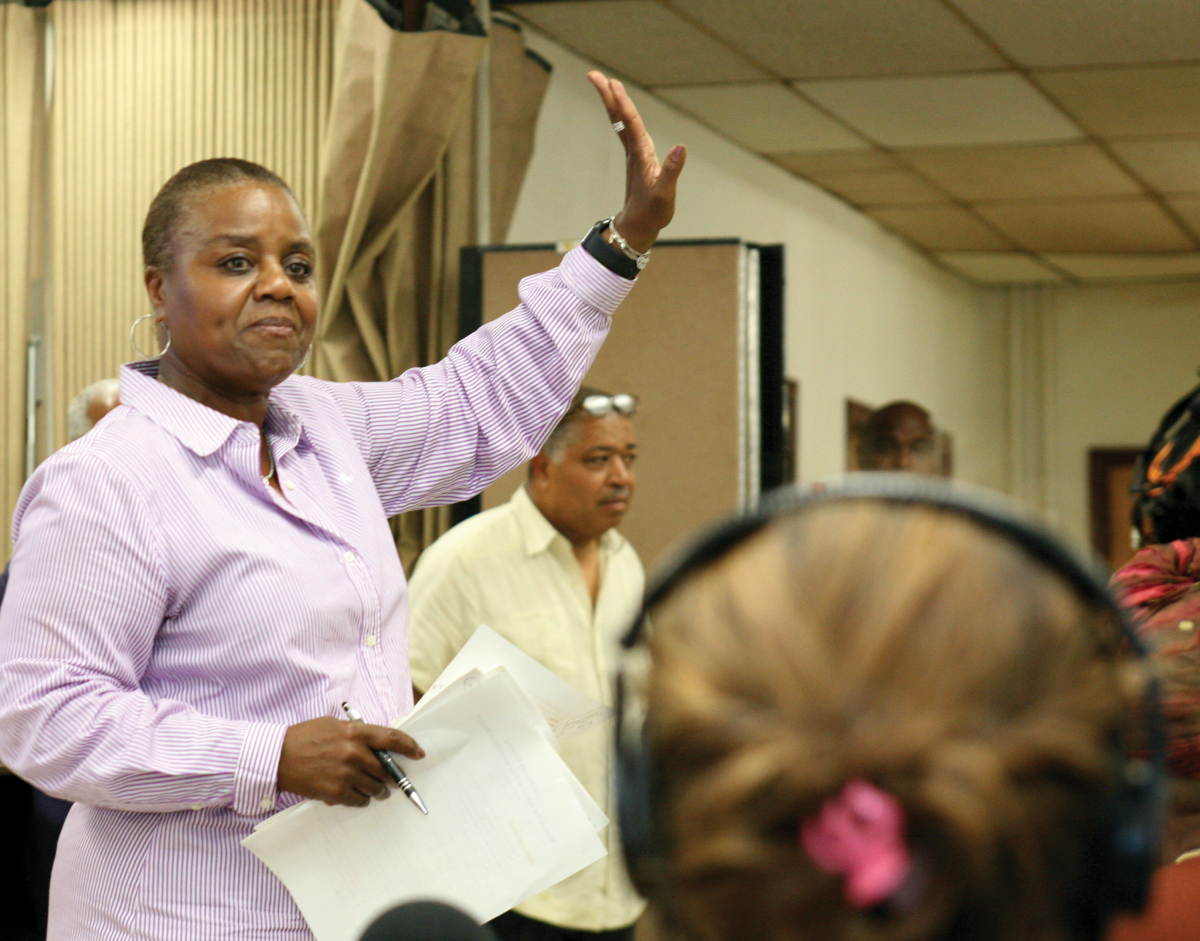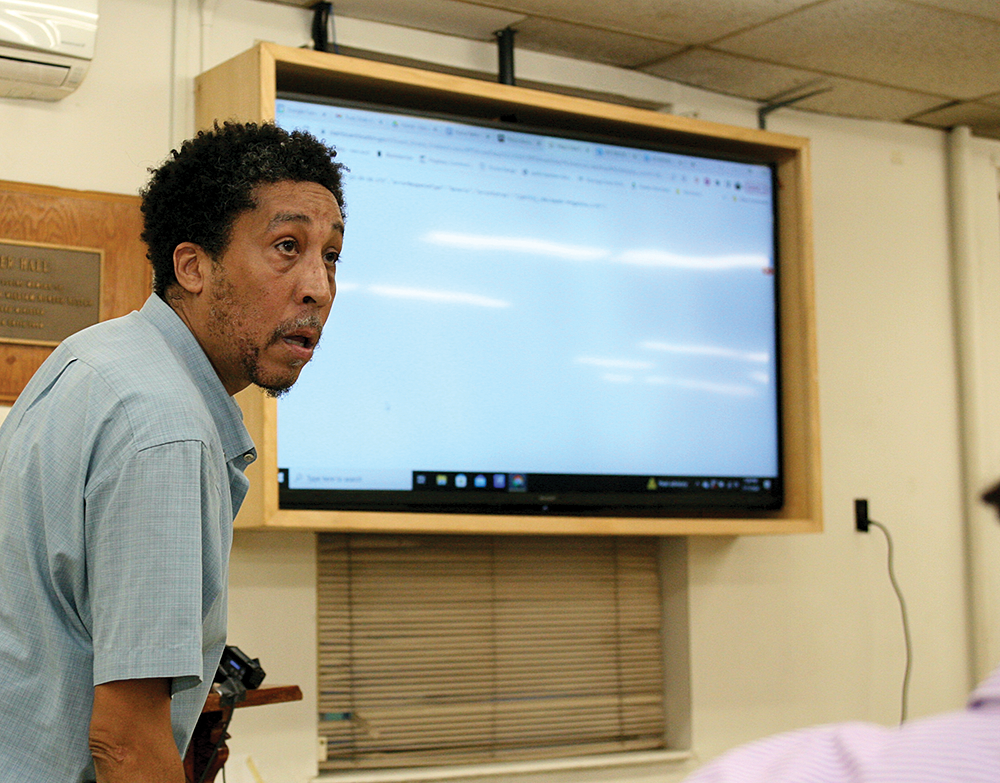July 24, 2024

Shirley Jones, of the Bowdoin-Geneva Task Force, said a petition to demote Commissioner Michael Cox needed to circulate in the community.
Outrage over the demotion of a well-respected Boston Police officer triggered a larger discussion about the city’s commitment to overall policing reforms during a lively public meeting held in the basement of Roxbury’s Twelfth Baptist Church on July 17. About 150 people packed the room to vent frustrations about BPD Commissioner Michael Cox’s decision earlier this month to demote Eddy Chrispin from the rank of Deputy Superintendent and remove him from his command staff.
Cox said the move was prompted by Chrispin’s appointment to the state’s Peace Officer Standards and Training (POST) Commission, which is charged with improving policing standards across Massachusetts.

Former state Rep. Marie St. Fleur, of Dorchester, was the host of the meeting on July 17. She said that as part of the former Boston Police Reform Task Force, she was “asleep at the switch” on implementation until the demotion of Eddy Chrispin.
Former state Rep. Marie St. Fleur of Dorchester, one of 11 members of a Police Reform Task Force in the city of Boston, served as a moderator during the two-hour meeting. “It’s your City Hall and your State House and your Police Department and your money,” she said. “We have to get engaged and don’t be cowards. If we can’t speak up, we’re going to leave a mess for our children and our neighborhoods won’t thrive.”
Jamarhl Crawford, who also served on the Boston task force, gave a presentation about how the city’s Office of Police Accountability and Training (OPAT) – which is separate from the state POST – has fumbled implementing basic information on its website. He pulled up the website in real time and clicked on several tabs that were not functional.

Jamarhl Crawford spoke up about an inept website. Seth Daniel photos
“There’s nothing there,” he said. “Three years, and there’s still nothing there. We need to push and demand what we want to be done.”
New OPAT Director Evandro Carvalho, of Dorchester, was in the room, but chose to only listen, and not to speak on the matters.
Also in attendance was Enrique Zuniga, the executive director of the state POST Commission, who reiterated his call for Chrispin’s demotion to be reversed.
“We believe there is no legitimate reason to have done that,” he said. “If I was Commissioner Cox, I would welcome the opportunity to have someone in my command staff vetting policy for the state. It is really backward.”
The meeting included roundtable discussions focused on several issues, including Chrispin’s demotion, Civil Service reform, and police reform.
“People are making decisions affecting us and our community and we don’t know why,” said Shirley Jones, of the Bowdoin-Geneva Task Force. “The demotion in itself we feel was not warranted and because we don’t know why…There is a petition circulating to restore Eddy Chrispin. We think we need to have Commissioner Cox explain the lack of transparency – and why don’t we also circulate another petition from our community that Commissioner Cox get demoted. Let’s get a petition for that.”
Said Marjorie Bernadeau of Haitian Americans United (HAU): “We want [Eddy] back in a leadership role in the Black community. We want him back into the community where he has been very effective.”
Long-time community member Bill Wright said he had always been impressed with Chrispin, who like himself, graduated from Boston Latin School (BLS).
“I believe the commissioner and mayor made a mistake in demoting him,” said Wright. “I think they believed when they threatened to demote him and the $40,000 in salary that would be lost, he would back down. What they found out is Eddy Chrispin has integrity.”
City Councillor Ed Flynn said, “If they can be this disrespectful to him, then what else can happen?” he asked. “My friend Bill Wright of Boston Latin School referred to the extraordinary role of the Police chief of staff…I might get in trouble for saying this, but the decision-making in the City of Boston Police Department is with the chief of staff. I think that’s unhealthy for the city and the community and the men and women of the BPD. That’s my opinion based on my experience.”
The current BPD chief of staff and senior advisor for Policy and Legal Affairs is Nicole Taub, who started last year and previously was with the Town of Braintree but worked at BPD in the past.
Councillors Brian Worrell and Julia Mejia, along with Council President Ruthzee Louijeune, spoke after the community members.
Mejia gave a fiery speech and said her hearing on reforms was met with “disrespect” from Commissioner Cox.
Larry Ellison, a recently retired BPD officer who is very active in the Dorchester-based Massachusetts Association of Minority Law Enforcement (MAMLEO), said Chrispin’s case is part of a pattern.
“This has been going on 50 years,” he said. “Eddy is just the latest victim of it and there will be other Eddy Chrispins if we don’t turn this around.”
Concluded St. Fleur: “We think that because people of color are sitting in position like this they will do things the way we would. It has nothing to do with color. It is about integrity and about character, and character informs accountability.”
MAMLEO held a second meeting on Chrispin and the status of police reform, and organizers of the July 17 meeting said they expected the conversation to fan out and continue in the months ahead.


